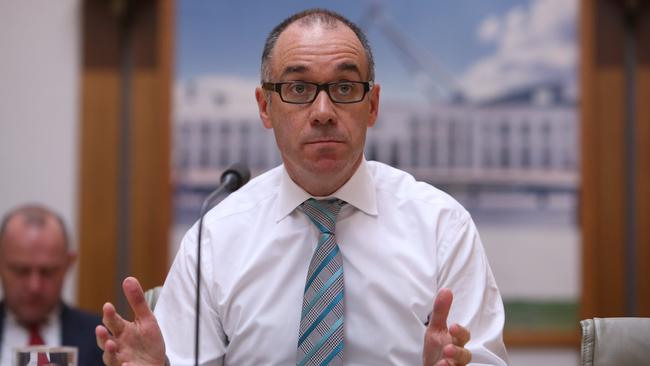NAB boss grilled over breach reporting
THE head of NAB has been accused of dodging a question three times and giving an “extraordinary” response during a grilling before parliament.

THE head of NAB has been accused of dodging a question during a grilling by a parliamentary committee amid concerns of poor conduct by the bank’s financial planning arm.
Andrew Thorburn, appearing before the House Standing Committee on Economics on Friday, was put on the back foot by committee chair David Coleman, who wanted to know why NAB objected to publicly releasing information about breaches of the law.
That recommendation, put out in the committee’s November report, would include specifying the breach, naming the senior executive responsible and whether the executive had suffered any consequences as a result.
NAB had informed the committee prior to Friday’s hearing that it would oppose the recommendation. Mr Thorburn revealed that there had been 1138 employees either disciplined or sacked for breaches of the bank’s code of conduct last year.
That included five senior managers, two of whom were dismissed and three who faced other disciplinary action. He said since 2009, 55 financial planners had been sacked for misconduct.
“What we have is a process we believe is very appropriate and adequate,” Mr Thorburn said. “If we believe there is misconduct there is a proper and full investigation, at the end of that if they haven’t been deemed to have met our standard, they leave the company.
“We report that to ASIC, then we look at their clients, go through in a thorough and detailed way clients in the portfolio that may have similar sorts of issues that the misconduct points to, and we go very deep on that.”
Asked why the bank would object to the “very simple process of releasing the information”, Mr Thorburn said: “We’re happy to continue that conversation.”
Mr Coleman said he had serious concerns about NAB’s response, which argued that “public reporting may act as a disincentive to report breaches”.
“What you mean by that is in a scenario where a breach has occurred, if you were to release that information publicly, you think your people might be inclined not to want to release it, which would be compounding one breach with another,” he said.
“I found that quite exceptional. I think that’s a very poor reason, [and] if anything it bolsters the need [for the reform].”
Mr Thorburn said the bank needed to go through a “very thorough process” that “respects the individual” and “given the complexity of the cases” he didn’t think it was right that the bank be required to report issues within a short time frame.
“I think the fact that last year we had 1138 people facing consequences for poor conduct shows we are taking this seriously.”
After repeated questioning, Mr Coleman said: “I’ll note you haven’t addressed my question, I’ve asked you three times, why not publicly release that information each time.”
Separately, Mr Thorburn defended the bank’s chief customer officer after being asked why Andrew Hagger, who was paid $4.1 million in 2015/16, hadn’t been dismissed over the bank’s financial planning products scandal.
“I think Mr Hagger has actually led this business well and lifted the standards and actually been part of the reason why I can sit before you today feeling a lot more confident that the processes, the standards and risk management in our wealth business is much higher than ever before,” he said.
Mr Coleman said that was a “fairly debatable comment” given the corporate regulator ASIC recently released information about four years of customer breaches requiring NAB to repay $35 million.
“He has been held accountable for what he needed to deliver,” Mr Thorburn said, insisting most of the issues occurred before he came in. “Fifty-five [planners dismissed] is too many, not good enough but it’s in the context of 4400 people.”
Labor MP Matt Thistlethwaite also grilled Mr Thorburn over the bank’s handling of former financial planner Graeme Cowper, who last year dropped a defamation case against the ABC and Fairfax.
“You allowed him to resign, you gave him a $180,000 payout,” he said. “He was on a base salary of $80,000 but, get this, he made $850,000 in one year, of which no doubt he shared commissions between himself and your bank, so NAB made a handsome profit out of him as well.
“I also understand you wrote him a very nice letter. This is a man that you’ve admitted breached your code of conduct, you’ve paid $7 million compensation to over 100 clients affected, and you allow him to resign and give him money.
“Are you living in the real world?”
In response, Mr Thorburn said “this world was 2009” and he was “very confident we have much clearer standards”. “Because of the litigious nature of this I don’t want to comment anymore and I can’t,” he said.
BIG BANK BOSSES FRONT UP FOR SECOND GRILLING
Kaaren Morrissey, AAP
WHAT’S IT ALL ABOUT
• The bank hearings were set up by the government. The first was held in October.
• This followed community uproar when the big four failed to pass on a central bank interest rate cut in August.
• It also headed off Labor and Greens calls for a full blown banking royal commission.
WHO’S GRILLING THE BANK BOSSES
The House of Representatives Standing Committee on Economics.
• The committee is chaired by government backbencher David Coleman, who happens to be the member for Banks, with Labor frontbencher Matt Thistlethwaite as deputy.
• There are six government members, three from Labor and Adam Bandt for the Greens.
• This is the second round of hearings on the performance of the banking system and how big banks balance the needs of borrowers, savers, shareholders and community.
• The chief executives of all the big four banks — NAB, CBA, Westpac and ANZ — have been called to appear.
WHAT THE BANKS NEED TO EXPLAIN
• How they make interest rate decisions.
• How they’re enhancing consumer protections and responding to reforms.
• How international economic and financial developments affect Australia.
• How developments in regulation, including capital requirements, affect their policies.
• What they think about the economy’s performance.
KEY ISSUES FROM THE OCTOBER HEARING
• The banks said Australians should not expect them to always match interest rate cuts by the central bank.
• They blamed funding costs as a major factor not to cut.
• They also admitted there was a “trust gap” between the industry and the community.
• The committee extracted apologies for past wrongs against customers.
• There were questions about why credit card interest rates are so high.
• This appears to have had some effect. ANZ last month cut rates on two cards by between 1pct and 2pct.
OTHER ISSUES FOR THIS HEARING
• Credit card interest rates.
• Housing market issues.
• Senior executive accountability when things go wrong.
• Industry association the Australian Banking Association — which is making its first appearance before the committee.
WHO’S APPEARING
• NAB chief Andrew Thorburn today.
• CBA chief Ian Narev and ANZ boss Shayne Elliott on Tuesday March 7.
• Westpac head Brian Hartzer and ABA CEO Steven Munchenberg on Wednesday March 8.
— with AAP




